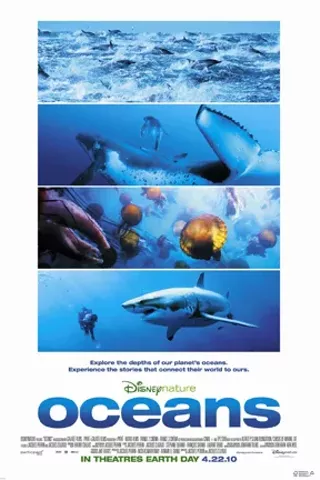You don't learn much watching Oceans—until it's over. Then it finally hits you: You've learned how marvelous nature is, and how fortunate we are to see it unfold.
A continuation of the Earth Day documentary series that Disney began last year with Earth, Oceans is a prohibitively expensive documentary, reportedly costing upward of $80 million. The result is one of the most gorgeously photographed films in a long time, inviting itself into the lives of species as varied as the impossible-to-imagine leafy sea dragon and the playful, familiar sea otter.
Watching these animals in their natural environments for extended sessions is nothing short of visual poetry. But unlike a lot of nature documentaries that remain focused on a specific subject, which keeps the story moving forward, Oceans is more a catalog than a dissertation, darting from sea to sea and from animal to animal. A great example of the difference between the two is March of the Penguins and its unique story.
But that is the beauty and perhaps the point of Oceans. To soak it all in, pardon the pun, the film has to demonstrate that there is wonder just beneath the surface wherever you happen to look. And to accomplish that—here's where that $80 million comes in—the 20 production companies that funded this film (not Disney, which only serves as a theatrical distributor) commissioned a gargantuan film crew consisting of three main cinematographers and roughly 30 camera operators.
The effect should be more jarring than it is; Oceans is utterly seamless, easily moving from one location to the next and giving equal time to distant cousins scattered all over the globe. Narrator Pierce Brosnan lays it on a little thick at times, imparting little factoids about each creature instead of divulging much in the way of complicated biology.
Is there a pointed political message here? Not as much as with other documentaries, because this is primarily an educational primer of what life is like in, say, an octopus' garden. At a certain point, though, the subject of pollution and manmade threats to the lives of these species has to come up, if for no other reason than the fact that trash and chemicals and overfishing and tuna nets are increasingly a part of the lifecycle.
However, as documentaries go, Oceans supplies a gentle suggestion that maybe the impact of mankind is the greatest predator of all. As Brosnan states toward the end of the film, "Every breath we take and every drop we drink depends on a healthy ocean. Now her survival depends on us." But the message is not overpowering so much as it is generally understood.
It is disheartening, though, to see satellite imagery showing trails of pollution, leaking from rivers into the world's oceans, looking like veins pumping poison throughout the body. When one of the intrepid camera crews captures a sea lion not knowing what to make of a shopping cart that's resting on the bottom of the ocean, you can't help but feel something—sadness, guilt, something.
While those scenes do make an unquestionable impact, the main thrust of Oceans is not a lecture, but rather a celebration—and the film itself is worth celebrating. The crews don't merely observe the lives of their subjects, but get up-close and personal with high-definition cameras. A mother seal coaxing her pup into the water for the first time is seen from perspectives on land and in the icy water. In one of the film's most astounding moments, pelicans dive-bomb a massive school of sardines in what can best be described as natural choreography.
Equally beautiful is what appears to be slow-motion footage of humpback whales, or maybe they just move that slowly. But never have they seemed so majestic on film. There's also a sequence that corrects a longstanding myth about the animal kingdom: An oceanographer, without a shark cage anywhere in sight, hitches a ride alongside a battle-scarred great white. Why doesn't the ferocious predator strike? Because great whites usually don't attack humans.
The end result is a film that may not be completely instructive, one that isn't concerned as much with mountains of information. It's a travelogue, a visual encyclopedia of how indispensible life underwater truly is. For what it sets out to do, Oceans isn't just successful; it's a once-in-a-lifetime accomplishment.











